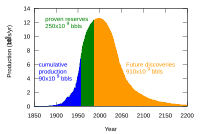
Photo from wikipedia
The wide popularity of smart meters enables the collection of massive amounts of fine-grained electricity consumption data. Extracting typical electricity consumption patterns from these data supports the retailers in their… Click to show full abstract
The wide popularity of smart meters enables the collection of massive amounts of fine-grained electricity consumption data. Extracting typical electricity consumption patterns from these data supports the retailers in their understanding of consumer behaviors. In this way, diversified services such as personalized price design and demand response targeting can be provided. Various clustering algorithms have been studied for electricity consumption pattern extraction. These methods have to be implemented in a centralized way, assuming that all smart meter data can be accessed. However, smart meter data may belong to different retailers or even consumers themselves who are not willing to share their data. In order to better protect the privacy of the smart meter data owners, this paper proposes two federated learning approaches for electricity consumption pattern extraction, where the k-means clustering algorithm can be trained in a distributed way based on two frequently used strategies, namely model-averaging and gradient-sharing. Numerical experiments on two real-world smart meter datasets are conducted to verify the effectiveness of the proposed method.
Journal Title: IEEE Transactions on Smart Grid
Year Published: 2022
Link to full text (if available)
Share on Social Media: Sign Up to like & get
recommendations!